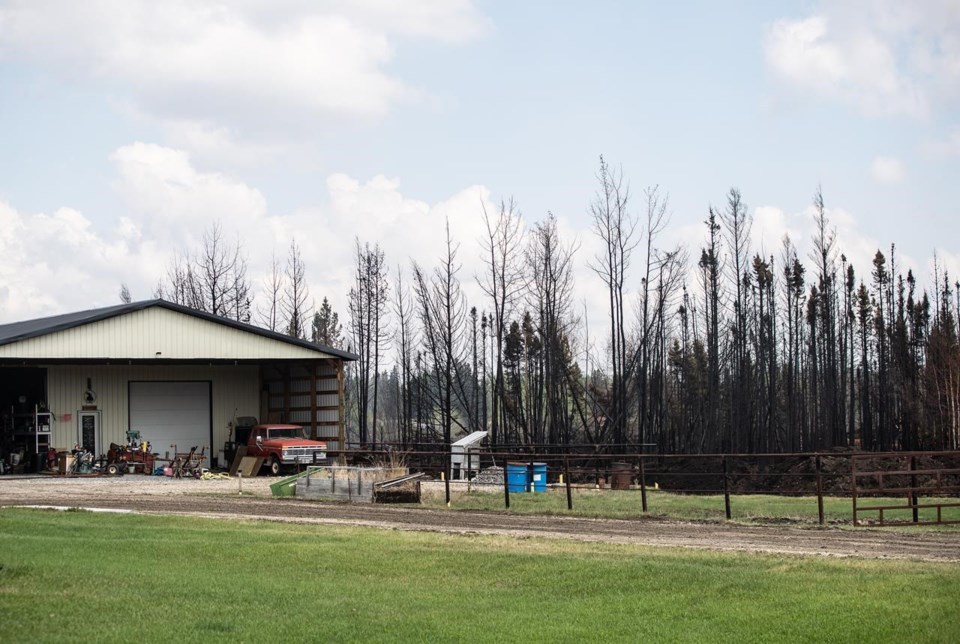The number of Alberta wildfire evacuees dropped Wednesday, but thousands remain out of their homes as firefighters braced for hotter, drier conditions in the coming days.
Colin Blair, director of the Alberta Emergency Management Agency, said the number of people out of their homes had fallen to below 18,000 from about 24,000.
"Alberta continues to be under a provincial state of emergency," he said Wednesday.
Wildfire danger also forced the evacuation of part of a First Nation southwest of Edmonton.
Corrine Bell with the O'Chiese First Nation Emergency Management Response Team said 103 people have been forced to leave the northern area of the reserve. One home has been lost and several have smoke damage.
"We're taking advantage of the gap in weather to tend to hot spots," said Bell, adding the community is hoping the wind won't change directions.
Six nearby First Nations have also offered their fire services to help.
"We've had an amazing support system from First Nations," Bell said.
Indigenous Services Canada said wildfires were threatening nine First Nations, including the Little Red River Cree Nation in northern Alberta, where more than 100 structures have been lost in the community of Fox Creek.
It said it's helping the First Nation set up temporary housing in nearby John D'or Prairie for 500 people, including a commercial kitchen and other amenities.
With no road in to the community, about 3,700 people had to leave by barge and boat.
In Brazeau Country west of Edmonton, Gary Edwards said he came back to his home shortly the area was evacuated to help prevent the fire from getting to nearby properties.
“I’m extremely fortunate with the community that I have around me, because they saved my house and my barn and we saved several other houses and farms around here,” Edwards said.
Edwards said that they have a team with a couple of water trucks, pressure trucks and a homemade fire truck.
“We go to the fire and put it out and all the hot spots.”
Zach Dressler, a septic cleaner in Drayton Valley, was also trying to help. Parked outside the Brazeau County office just north of Drayton Valley, Dressler waited in his water truck to get a permit to enter the town that was evacuated Thursday night.
“I’m crying … my mental health is deteriorating really fast because I can’t find somebody to help,” said Dressler.
“We all own fireproof clothing. I have fireproof boots — we do this every day and we're being told, no, we can't help,” said Dressler. “We're not firefighters, but we're professionals.”
Dressler said that RCMP have been threatening to arrest and fine those who don't comply with evacuation orders.
RCMP spokesperson Fraser Logan said Wednesday that no arrests have been made.
Blair said people who want to support with donations or by volunteering, they can email [email protected].
“If we require the assistance, we will get in contact,” said Blair.
Karen Prevost of Drayton Valley said that she has gone through fire evacuations in previous years.
“I'm alive and my family is safe,” Prevost said. “That's all that matters.”
Prevost is currently in Tomahawk, a hamlet about 35 kilometres northeast of Drayton Valley.
“I'm not in a rush to get home even when they do open it, because the grocery stores need time to get their freezers cleaned up and stuff because their power was out,” said Prevost. “People need to be patient.”
Earlier Wednesday, an evacuation order was lifted for the hamlet of Evansburg, Alta., about 120 kilometres west of Edmonton, after residents were told to leave late last month as dry and windy conditions fuelled wildfires that put the hamlet and surrounding rural area at risk.
Blair said Alberta remains under a state of emergency with 20 communities calling local states of emergency. Four band councils have passed similar resolutions and there are 13 evacuation notices in place.
Christie Tucker of Alberta Wildfire said firefighters were battling 76 active wildfires Wednesday afternoon, 24 of which were out of control. She said activity was expected to increase as temperatures rise and humidity falls later in the week.
"Albertans may see more smoke and activity on wildfires as it warms up toward the weekend," she said.
"Firefighters have been working hard preparing for more challenging conditions, building firebreaks around communities and making use of fresh firefighters."
Firefighters from Yukon, British Columbia, Ontario, Manitoba and Quebec have arrived in Alberta to help. The government said Tuesday that crews were also expected from New Brunswick, Oregon and Alaska.
"That's going to be a much-needed boost for our firefighters who have been at this, some of them around the clock, for quite a while," Tucker said.
City of Edmonton spokeswoman Lisa Glover said numbers of evacuees at the Expo Centre fluctuated Wednesday
"Yesterday we served about 1,000 meals, however, only 10 individuals stayed the night," she wrote in an email.
This report by The Canadian Press was first published May 10, 2023.
___
This story was produced with the financial assistance of the Meta and Canadian Press News Fellowship.
Ritika Dubey and Angela Amato, The Canadian Press




